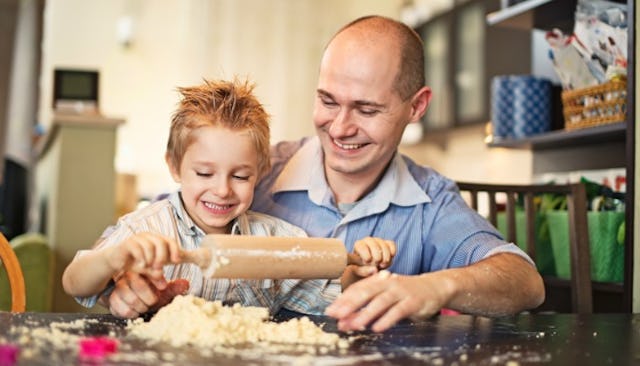SAHMS Can Raise Feminists, Too

At first glance, I’m an average, stereotypical-looking SAHM. I raise my two young sons (ages 4 and 1), I don’t work outside the home, and I take care of all of the household chores and administrative tasks that being an adult requires. I bake lots of precious cupcakes.
I like my role in my family. I enjoy spending loads of time with my kids and keeping our home clean and safe, and I actually love to go grocery shopping. But I’m also a feminist, and I’m well aware of the intrinsic message that I’m sending my two boys when they see their father leave for work in the morning, and their mother is at home doing paper crafts and reading them stories. I did choose this life as a SAHM, for now, and it is crucial to me that they understand that.
So how do I teach my sons to treat women as equals and combat gender stereotypes when their mom is at home in an apron and their dad is at the office?
1. Get the Boys Involved in Everything
My days involve lots of chores, errands and repetitive tasks. Fortunately, the kids can already help out with much of what I do. I’m a big believer in giving children jobs around the house, anyway. So, while I fold the laundry, wash the dishes, dust the bookshelves, and all manner of other domestic tasks, I ask my oldest son to help alongside me. Sometimes he balks, or he actually hinders the progress more than he helps it, but I always insist. Additionally, I make sure that the kids are helping my husband with the household jobs that he normally takes on, like cooking and vacuuming.
2. Watch What I Say
Any time I think about asking my husband if he can “take care of the kids while I go out” or when I want to angrily mutter about a dirty floor while I pull out the broom, I remember that my son is watching and listening to everything I say. I’m around him all the time, and it’s easy to forget that my words do matter. So I do my best to speak to my husband as the primary caregiver he is, and I try not to make housework and child-rearing sound like the unfortunate cross that I, as a SAHM and woman, must bear.
3. Teach Them About Feminism
Coming from an education background (I’m a former elementary school teacher), I love overt, direct lessons about the hard topics in life: Social-emotional teaching can be a challenge, but it’s also so rewarding to see its effects. The same is true for the murkier human rights conversations that may even make some adults uncomfortable. But at home, we dig right into it (age-appropriately, of course), talking about inequality, stereotypes, oppression and feminist leaders (just to repeat, age-appropriate is key here). In doing so, I’m aiming to give my kids the tools to question the norms of the world and look at things more inquisitively instead of accepting what is the status quo.
4. Tell Stories
Storytelling is good for children anyway, so there might as well be subtly hidden lessons included within the stories. I tell my children stories all the time, with what I hope is an inclusive range of characters: daddies who stay at home with the kids, female construction workers, dragon-fighting princesses. Since the stories are your own, you can really be creative and expansive with the characters you include and what their adventures might be.
5. Question All Generalizations
My oldest, who is 4 years old, is into making “rules” about the world: “Mommy looks like this, so all girls look like this.” “Daddy does this, so all boys do this.” Whenever he makes a generalization, I’m quick to challenge it and give counter-examples. So when he asks, “Do only dads do computer programming?” I tell him “no,” and then give specific examples of women who code and “work on computers,” just like his father does.
6. Remember That It Takes a Village
Enlist the support of other adults and younger mentors, like teenagers and older siblings. Include family and friends in the ongoing conversation about gender stereotypes and equality. This exercise is not only beneficial to the kids, but to the adults as well.
There are no guarantees in parenting, but we all try our best with whatever we’re given. Despite my choice to be a SAHM, it’s my hope that I’m doing something right in raising little boys who will never expect others (or themselves) to take on roles or responsibilities based solely on their gender.